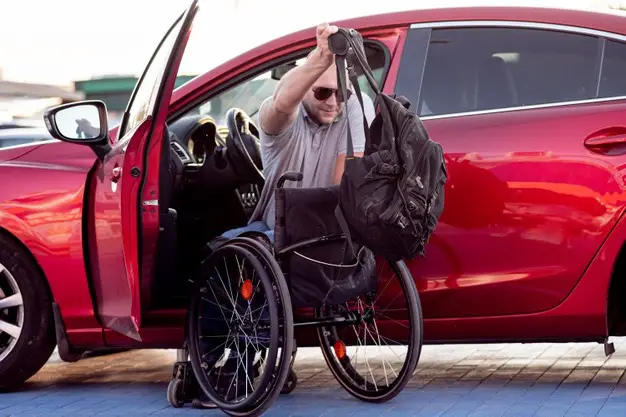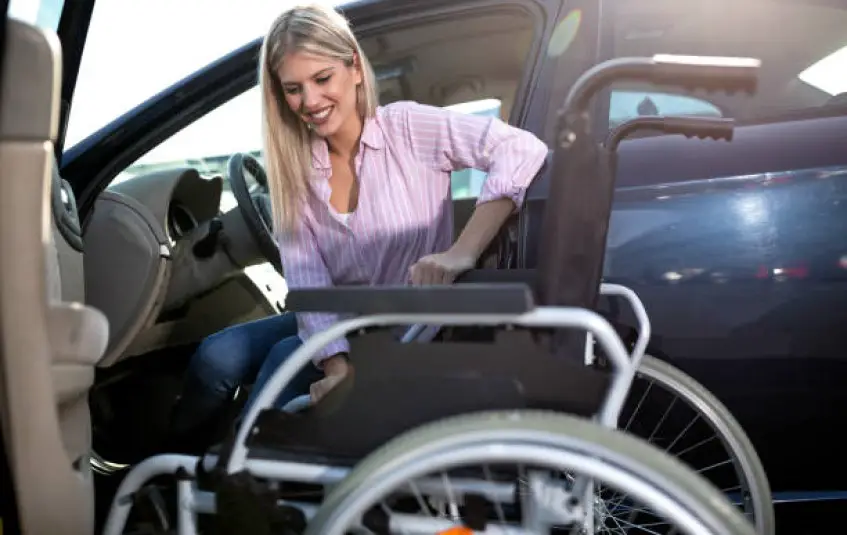People with disabilities find it difficult to benefit from the privilege of owning and driving a car, owing to the barrier with their hands, legs, or limbs.
But here’s a small catch.
Permanently disabled drivers can compensate for their disabilities using adapted vehicles. Sounds great, right?
Let’s take a closer look at what disabilities can drive a car.
Yes, not every disability is eligible to drive a vehicle, so I’ve taken it upon myself to list the disabilities that are eligible to drive a car. Make sure to read to the end.
Table of Contents
What Disabilities Can Drive a Vehicle?
There are several types of disabilities, and their effect on activities varies. Although, every state has laws that prevent abuse and victimization of disabled persons. These laws also give disabled persons the right to own and drive a car.
Here are the type of disabilities that can get a vehicle compensation for their disability.
Related: What the Rehabilitation Benefit Covers in a Disability Income Policy
People with no limbs
There can be an absence of limbs due to disorders, amputation, and diseases. However, persons without limbs can drive as long as they can safely. Check the section below to see how people without limbs can access and drive a vehicle without issues.
Reduced limb function

This condition is one where limbs are not of normal size but reduced due to an accident or failure to form completely in the womb. But the good news is that if you fall in this category, you can and should consider driving a car to make life easier for you.
Neuromuscular disease
Neuromuscular disease affects the peripheral nervous system and causes muscle atrophy and weakness. Nevertheless, anyone with neuromuscular disease can use an adapted vehicle.
Cystic fibrosis
This condition is a progressive genetic hereditary disorder. But, depending on the severity, disabled persons can compensate for their disabilities.
Parkinson’s disease
Although this nervous system disorder affects mobility, people with Parkinson’s can drive a vehicle. All they need to do is get their disabled driver’s license and parking permit.
Spinal cord injuries
These depend on the severity and damage location. Ensure that you check with your local law to confirm your eligibility to drive a vehicle with spinal cord injuries.
Muscular dystrophy
Muscular dystrophy causes the loss of muscle mass and strength, and this condition allows the use of special motors on the roads.
Traumatic brain injury
If you have a traumatic brain injury, you can compensate with modifications to your vehicles.
Mobility issues
The same goes for people with mobility issues. You can incorporate adaptive equipment into your vehicles to meet your driving needs.
Hemiplegia/Paraplegia
Here’s the best part. There are existing and new adaptive motor technology for people with Hemiplegia or Paraplegia. It is the safest way to help you drive on the road.
Multiple sclerosis
Motor technology has gotten better and can help disabled people in this category (multiple sclerosis) meet their driving needs.
Related: 4 Best Services Available to Handicapped Persons
How to Source Adapted Vehicles for People with Disabilities

The number of disabled persons is increasing daily, and there’s a need to provide them with the necessities to make their life easier.
This is where adapted vehicles fit in thanks to technological advancement. Disabled persons can modify their vehicles using adaptive equipment to compensate for their disabilities.
This equipment ranges from hand controls to swivel seats and large doors. The point is to get comfortable and safe when driving your vehicle. So, I will show you how to source an adapted vehicle to compensate for your disability without wasting time.
Evaluate your needs
You must understand your disability needs before selecting the adaptive equipment to aid easy driving. Consult a rehabilitation specialist to evaluate your needs and help you get the right vehicle.
The evaluation process may include vision screening, range of motion, muscle strength, flexibility, decision-making abilities, coordination and reaction time, etc. A detailed report containing specific driving restrictions, requirements, and recommendations would accompany the process. Don’t forget the recommended vehicle adaptive equipment.
Related: Homes for People with Disabilities: Everything You Should Know
Inspect for the right vehicle
Regardless of the recommended adaptive equipment, you should go only for the right vehicle. The right vehicle will allow you to get comfortable and confident on the road. You should consider visiting the car dealer with your rehabilitation specialist if you are buying a new car. If using your old car, get a specialist to do the modifications for you.
The right vehicles for disabled persons should have the following features;
- Adjustable foot pedals
- Extra-wide or high doors
- Dashboard mounted ignition
- Seat adjusters
- Support handles
- Oversized knobs
- Large interior door handles
You should also ask yourself the following questions before buying a vehicle to compensate for your disability.
- Is there adequate space to park the vehicle in your house and office?
- Can the vehicle’s cargo capacity accommodate the adaptive equipment?
- Will you need other things to safely operate the vehicle when modified?
Training and education
It’s safer to undergo professional training with your modified vehicle and adaptive equipment. It will reduce the chances of accidents or injuries while driving with the newly installed technology.
There are several driver education for disabled persons. It will help you master the modifier controls and become a better-disabled driver.
And like the normal driver education, only disabled persons from the ages of 16 are eligible to apply for the disabled drivers’ education. You also need a disabled driver’s license and parking permit to compensate for your disabilities.
The disabled parking permit allows you to park in spaces reserved for disabled persons. It will also give you access to metered parking and time-limited parking spaces without paying or being charged for parking longer than usual.
You can get the disabled driver’s parking permit application from your local office. Fill in your details correctly and submit the application form at the appropriate quarters. Remember that driving is fun and an exercise on its own. Your disabilities should not stop you from driving, so go out there and drive responsibly.
Check Out Similar Posts
- 7 Easy Ways to Deal with a Difficult Client as a Caregiver
- How to Be a Good Caregiver to a Little (Ultimate Guide)




